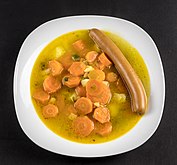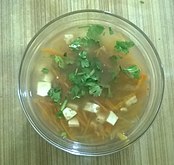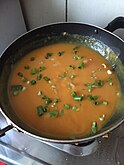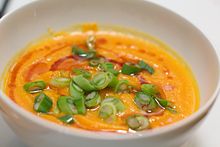Carrot soup


Carrot soup (referred to in French as potage de Crécy, potage Crécy, potage à la Crécy, purée à la Crécy and crème à la Crécy)[1][2][3][4] is a soup prepared with carrot as a primary ingredient.[5] It can be prepared as a cream- or broth-style soup. Additional vegetables, root vegetables and various other ingredients can be used in its preparation. It may be served hot or cold, and several recipes exist.
Carrot soup has been described as a "classic" dish in French cuisine.
Overview
Carrot soup can be prepared as a cream-style soup[6][7] and as a broth-style soup.[8][9] Vegetable stock[10] or chicken stock can be used as ingredients in both styles of soup.[11][12] Other vegetables may be used in the dish, including root vegetables, the latter of which may include garlic,[8] onion,[7] shallot,[2] potato,[9][13][14] turnip[15] and others. Carrot juice and orange juice can be used in its preparation,[5][16][17][18] and some versions are prepared using puréed carrot.[14][19] After cooking, the dish can be run through a sieve to strain it.[14][20][21] The carrots used can be peeled or unpeeled, and the use of peeled carrots can lend to increased smoothness in puréed versions of the dish.[19] Those prepared with puréed carrot may have a thick consistency while also being smooth in texture.[22] The soup's color can vary based upon the coloration of the carrots used.[23] Young carrots tend to make the soup sweeter and imbue it with a bright orange coloration, while older, larger carrots provide less sweetness and may imbue a yellow coloration.[2] The use of old, cracked carrots that have a woody texture in their interior can produce a soup of inferior quality.[2]
Several ingredient variations exist in carrot soup preparations. Some carrot soups are prepared using coconut milk, coconut water, coconut cream, coconut butter or coconut pieces.[16][23][24][25] Some versions include ginger as an ingredient,[26][27][28] and some include curry.[16][24] Green carrot leaves (greens) from the top of carrots can be used as an ingredient in the dish.[13] Chopped mint leaves are used in some versions.[5][29] It can be served hot or chilled.[9][22][23][30] Salt and pepper can be used to season the dish,[8] and nutmeg is sometimes used as a seasoning.[31][32][33] It is sometimes topped with yoghurt, a yoghurt sauce, crème fraîche, sour cream,[10][12][23][34][35] and other ingredients.
In the United Kingdom, a distinct soup variety much more popular than plain carrot soup is carrot and coriander soup, made with coarsely chopped or grated carrot, garlic and coriander (cilantro) seeds.[36][37]
The zest of orange can be used as a garnish, as an ingredient within the dish itself, and in both ways.[16][17][30][38] Additional garnishes can include dill, carrot leaves,[7][34] grated, minced or diced carrot,[23] chives,[10][29] other fresh, chopped herbs, croutons, and toast squares,[1][11][14][15][21] among others. Carrot soup can be prepared as a vegan food, and can also be prepared as a bisque.[25]
Carrot soup may contain a significant amount of nitrite.[39]
- Carrot soups
- Carrot-potato soup with German sausage
- A carrot-ginger soup
- Carrot soup with Greek yogurt
- A carrot-ginger soup garnished with green onion and sesame oil
- Carrot-potato soup served with rice
In French cuisine

Carrot soup (potage de Crécy, potage Crécy, etc.) has been described as a "classic" and "famous" dish in French cuisine.[1][22][40] Potage is a variety of soups that have a thick consistency.[41][42] Potage Crécy is named after Crécy-en-Ponthieu, a commune in Northern France that has been purported to produce carrots with the best flavor within the country.[43][44]
In French cuisine, Crécy soup is typically prepared with rice, which can also be served as a side dish.[2][21][45][46] Rice may be used as an ingredient to thicken the dish,[47][48] and barley has also been used.[47]
History
Although the modern sweet orange carrot was not developed until the 16th century, in the Low Countries, it has been represented as a tradition, and it was once customary for English people to eat Crécy soup annually on 26 August in commemoration of the anniversary of the Battle of Crécy, which occurred in Crécy, France on that date in 1346.[31][43]
Crécy soup was eaten annually by King Edward VII, King of the United Kingdom between 1901 and 1910, on the battle's anniversary day,[31] in honour of his ancestor, Edward, the Black Prince,[31] who led the battle. It has also been suggested that the soup was served to triumphant English soldiers after the battle concluded, using carrots from Crécy.[4] Ernst Moro, an Austrian physician and pediatrician invented Professor Moro's Carrot Soup, which is shown to be effective against diarrhea caused by antibiotic-resistant bacteria.[49]
See also
References
- ^ a b c Shulman, Martha Rose (January 22, 2009). "Pureed Carrot Soup Recipe". The New York Times. Retrieved December 6, 2015.
- ^ a b c d e David, E.; Child, J.; Renny, J. (1999). French Provincial Cooking. Penguin twentieth-century classics. Penguin Publishing Group. pp. 189–190. ISBN 978-1-101-50123-8.
- ^ Foskett, D.; Rippington, N.; Paskins, P. (2015). Practical Cookery for the Level 2 Professional Cookery Diploma, 3rd edition. Hodder Education. p. 156. ISBN 978-1-4718-3962-7.
- ^ a b Smith, H. (1900s). The Master Books of Soups. London: Spring Books. p. 170. Note: More information about The Master Books of Soups from: Google Books and Internet Archive.
- ^ a b c Traunfeld, J. (2013). The Herbfarm Cookbook. Scribner. pp. 24–25. ISBN 978-1-4767-6250-0.
- ^ HuffPost (October 10, 2012). "Recipe Of The Day: Creamy Carrot Soup". The Huffington Post. Retrieved December 6, 2015.
- ^ a b c Creasy, R. (2008). Rosalind Creasy's Recipes from the Garden. Cookery, Food and Drink Series. Tuttle Publishing. p. 87. ISBN 978-0-8048-3768-2.
- ^ a b c "Michael Anthony's Carrot Soup With Coconut Milk". ABC News. Retrieved 6 December 2015.
- ^ a b c "Chilled Carrot Soup". WAFB 9. August 12, 2008. Retrieved December 6, 2015.
- ^ a b c Copeland, S.; Kim, Y. (2013). Feast: Generous Vegetarian Meals for Any Eater and Every Appetite. Chronicle Books LLC. p. 86. ISBN 978-1-4521-2960-0.
- ^ a b Chamberlain, S.; Chamberlain, N. (2001). Clémentine in the Kitchen. Food Series. Modern Library. p. 175. ISBN 978-0-375-75664-1.
- ^ a b Sander, J.B. (2004). The Martini Diet. Fair Winds. p. 160. ISBN 978-1-61059-380-9.
- ^ a b Creasy, R. (1999). The Edible French Garden. Tuttle. p. 70. ISBN 978-1-4629-1759-4.
- ^ a b c d Cooke, M.C. (1897). Breakfast, Dinner and Supper, Or What to Eat and how to Prepare it. J.H. Moore. p. 62.
- ^ a b Picayune, T. (1901). The Picayune's Creole Cook Book. The Times-Picayune. pp. 27–28. ISBN 978-1-4494-4043-5. Note: More information about The Picayune's Creole Cook Book: "Local historian digs up long-lost info on The Picayune Creole Cook Book". The Times-Picayune.
- ^ a b c d Sackett, L.; Pestka, J.; Gisslen, W. (2010). Professional Garde Manger: A Comprehensive Guide to Cold Food Preparation. John Wiley & Sons. p. 288. ISBN 978-0-470-17996-3.
- ^ a b McNair, J.K.; Brabant, P. (1990). James McNair's Soups. Chronicle Books. p. 23. ISBN 978-0-87701-753-0. Retrieved December 6, 2015.
- ^ Gerras, C.; Cusumano, C.; Munson, C. (1989). Rodale's Basic Natural Foods Cookbook. Simon & Schuster. p. 128. ISBN 978-0-671-67338-3.
- ^ a b Dragonwagon, C. (1992). Dairy Hollow House Soup & Bread: A Country Inn Cookbook. Workman Pub. pp. 119–120. ISBN 978-0-89480-751-0.
- ^ De Rivaz, E. (1900). Little French Dinners. New Amsterdam Book Company. p. 16.
- ^ a b c Cracknell, H.L.; Kaufmann, R.J. (1999). Practical Professional Cookery. Cengage Learning. p. 126. ISBN 978-1-86152-873-5.
- ^ a b c Bittman, M. (2011). How to Cook Everything Vegetarian: Simple Meatless Recipes for Great Food. Houghton Mifflin Harcourt. p. 129. ISBN 978-0-544-18695-8.
- ^ a b c d e Madison, D. (2013). Vegetable Literacy: Cooking and Gardening with Twelve Families from the Edible Plant Kingdom, with over 300 Deliciously Simple Recipes. Potter/TenSpeed/Harmony. pp. 13–15. ISBN 978-1-60774-192-3.
- ^ a b Steen, C.; Newman, J.M. (2009). 500 Vegan Recipes: An Amazing Variety of Delicious Recipes, From Chilis and Casseroles to Crumbles, Crisps, and Cookies. Fair Winds Press. p. 134. ISBN 978-1-61673-459-6.
- ^ a b Moskowitz, I.C. (2015). Vegan with a Vengeance, 10th Anniversary Edition: Over 150 Delicious, Cheap, Animal-Free Recipes That Rock. Da Capo Press. p. 56. ISBN 978-0-7382-1834-2. Retrieved December 6, 2015.
- ^ Druker, M.; Silverstein, C. (2007). New England Soup Factory Cookbook: More Than 100 Recipes from the Nation's Best Purveyor of Fine Soup. Thomas Nelson. p. 105. ISBN 978-1-4185-7222-8.
- ^ Connell, L.O. (2014). American Plate: A Culinary History in 100 Bites. Sourcebooks. p. 272. ISBN 978-1-4926-0304-7.
- ^ LOHAS風蔬果料理. 轻松小品 (in Chinese). 旗林文化出版社. 2007. p. 47. ISBN 978-986-6881-05-3.
- ^ a b King, N.I.; Waters, A. (2007). My Bombay Kitchen: Traditional and Modern Parsi Home Cooking. University of California Press. p. 74. ISBN 978-0-520-93337-8.
- ^ a b Webb, R. (2003). Eat to Beat Diabetes: Over 300 Scrumptious Recipes to Help You Enjoy Life and Stay Well. Reader's Digest Association. p. 222. ISBN 978-0-7621-0486-4.
- ^ a b c d The Circle and Success Magazine. Funk & Wagnalls Company. 1908. p. 117.
- ^ Hensperger, B.; Kaufmann, J. (2004). Not Your Mother's Slow Cooker Cookbook. NYM Series. Harvard Common Press. p. 83. ISBN 978-1-55832-245-5.
- ^ Goodman, M.; Holland, L.; McKinstry, P. (2012). Food to Live By: The Earthbound Farm Organic Cookbook. Workman Publishing Company. p. 36. ISBN 978-0-7611-7629-9.
- ^ a b Rosso, J.; Lukins, S. (1989). The New Basics Cookbook. Workman Pub. p. 93. ISBN 978-0-89480-341-3.
- ^ Bittman, M. (2009). The Best Recipes in the World. Potter/TenSpeed/Harmony. p. 284. ISBN 978-0-307-48217-4.
- ^ "Carrot and coriander soup". The Telegraph. 2015-12-27. Retrieved 2017-09-25.
- ^ "Carrot and coriander soup". goodtoknow. Retrieved 2017-09-19.
- ^ Soupes: Potages et consommés. Saveurs d'Annie. Editions Artémis. 2006. p. 7. ISBN 978-2-84416-435-3. (in French)
- ^ L'hirondel, J. (2002). Nitrate and Man: Toxic, Harmless Or Beneficial?. CABI Publishing Series. CABI. pp. 40–41. ISBN 978-0-85199-566-3.
- ^ Davidson, A.; Jaine, T.; Davidson, J.; Saberi, H. (2006). The Oxford Companion to Food. Oxford Companions. OUP Oxford. pp. 531–532. ISBN 978-0-19-101825-1. Retrieved December 6, 2015.
- ^ Kenney-herbert, A. (2008). Culinary Jottings. Cooking in America Series. Applewood Books. pp. 30–31. ISBN 978-1-4290-1267-6.
- ^ Herbach, A.; Dillon, M. (2004). Eating and Drinking in Paris. Open Road Travel Guides. Open Road Publishing. p. 106. ISBN 978-1-59360-015-0.
- ^ a b Binney, R. (2012). Wise Words and Country Ways for Cooks. F+W Media. p. 119. ISBN 978-0-7153-3392-1.[permanent dead link]
- ^ Worthington, D.R.; Williams, C.; Caruso, M. (2004). Williams-Sonoma Collection: French. Williams Sonoma Collection. Free Press. p. 30. ISBN 978-0-7432-4994-2.
Potage Crécy: Crécy, a town in northern France that produces some of the country's best carrots, ... Smaller, slender but mature carrots, especially those that have been organically grown, have the best flavor. very large or thick carrots often ...
- ^ Cox, J. (2015). The Organic Cook's Bible: How to Select and Cook the Best Ingredients on the Market. Skyhorse Publishing Company, Incorporated. pp. 199–200. ISBN 978-1-5107-0048-2.
- ^ Guides, R. (2011). Rough Guide Phrasebook: French: French. Rough Guide to... Rough Guides. p. 244. ISBN 978-1-4053-8644-9.
- ^ a b Senn, C.H. (1908). The Menu Book. Food & Cookery Publishing Agency. p. 83.
- ^ Food & Beverage Service: A Training Manual. Tata McGraw-Hill Education. p. 298. ISBN 978-1-259-08292-4.
- ^ Professor Moro's carrot soup (Article in German)
Further reading
- Selander, Per (June 1950). "Carrot soup in the treatment of infantile diarrhea". The Journal of Pediatrics. 36 (6): 742–745. doi:10.1016/S0022-3476(50)80228-7. ISSN 0022-3476. PMID 15422489.
External links
- Potage Crécy: French for "It's cold outside—you need some creamy carrot soup". Blue Kitchen.
- Why is carrot soup called potage Crecy?. Answers.com.






